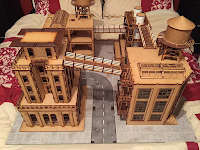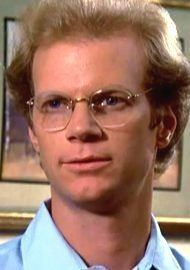 |
| Conductor: Tristor Von Kreighton |
 |
| Kamirtia Tiefling Flutist |
 |
| Delundin Tiefling guiterre master |
 |
| Dryaug Heng Trox Pipe Organ |
 |
| Vormos Fetchling Trumpet |
 |
| Cheyvor Glass Ifrit Violin I |
 |
| Loriche Human Violin II |
 |
| Athardyn Firbolg Double Bass |
The EveningIsles
Naper’s Dawn-a five tiered city of historical importance, Naper’s Dawn is the city that King Triskelion won a hard fought victory over the pirate led rebellion some 850 years ago.
Now primarily a trade city, Naper’s Dawn is also known for Labiatar’s Hope, a school paid for and operated by the Ferryman’s League. Its sits atop the uppermost tier of the city and is source of civic pride.
The schools regimen and design was adopted by the other schools and universities throughout Tier Ne Somenhiem. Naper’s Dawn is also the Eastern barony/county seat of Baron Sambrial Zarl IV.
The Sundering physically moved the majority of Naper’s Dawn, destroying the rest of city. It was the Ferryman’s League that rebuilt the city and returned order and opportunity to the people there. Metropolis
Corruption +7; Crime +5; Economy +2; Law +0; Lore +5; Society +3, Danger +20
Kingdom Evening Isles Duchy Tier Ne Somenhiem City Naper's Dawn
Population 75,000 (30,000 humans*; 10,000 halflings; 8,000 elves; 5,000 half-elves; 4,000 gnomes; 3,000 dwarves, 15,000 misc including tengu, catfolk, tiefling, aasimar, fetchlings and changelings)
*Human numbers include elemental blooded races Ifrit, Oread, Sylph, and Undine.
MARKETPLACE
Purchase Limit 500,000 gp; Spellcasting 9th
GrumbleBelly is a large three story building encompassing three Naper’s Dawn city blocks. Some but not all the amenities Grumblebelly has are shops, steam baths, storm shelters, barber, tailor, ‘entertainment’, and several game parlors. The Grumblebelly is owned by the Merryweather family a founding Ferryman’s League member.
 |
| GrumbleBelly |
 |
| Rear Skyview of GrubleBelly |
Stinky Treats, Junkyard , Refuse and Recovery. Krekel Barnberry a black feathered Tengu handles garbage in Naper’s Dawn. The Baron is frequently handling complaints and ruling on whether certain items are in fact garbage and meant for his workers to recover. The problems are put up with because Naper’s Dawn is exceptionally clean and well kept. Krekel’s cousin Klinnon Barnbery handles waste and waste system process for the city.
 |
| Stinky Treats |
 |
| Krekel Barnberry |
Grandma’s Buns is a Halfling ran bakery, Grandma is a character they all play to attract business, very popular with kids. Irlas, Achaw and Buren are three siblings who took over the families bakery. Irlas and his sister Achaw are experts in baking, marketing, and business. Buren, unbeknownst to his two siblings, is an information broker, linguist and thief. His number one contribution to their business is the Grandma character that he is stuck performing the most often of the three, much to his chagrin.
 |
| Irlas and Achaw |
 |
| Foidra Kosang |
The Mended Merchant, a reseller consignment shop is owned and opearated by Marja Garland. Her sister Yvvonne Garland is a adjunct professor at Labiatar's Hope. The Mended Merchant isn't located in the Marketplace, rather it is operated out of Old Towne.
The Marketplace is centrally located between the various neighborhoods located in the newer portion of the city. The Marketplace is just south of the Government District. Many businesses operate out of The Marketplace, some of which are listed below.
 |
| Naper's Dawn Marketplace |
Shields from Darkness is a vendor selling Candles, Lamps, Lanterns, Oils, and Torches
Zarlaw Standards is a Grocer and General Store
Grandma's Buns is located in the Marketplace
Kreighton's Inks and Dyes.
Lintu Glass. Vials, eyewear, windows, labratory equipment! If its made of glass you bet your ass it's Lintu.
Vaertom's Alchemical Supply and Sale
Toolworks! A tool for every problem!
***************************************************************************
Mid-Wife Mansion a Hospital of Remedies, and Rest is located in the older section of Naper's Dawn just inside the old outer wall. All of the local faith's along with The Ferrymen's League fund and support the local hospital.
 |
| Mid-Wife Mansion |
 |
| Zamkar Trutheye |
 |
| Yoosael al-Luqmar |
Yoosael's surroundings were unfamiliar to him but to his dissapointment, the summoning chamber had been properly prepared for his arrival. A woman's voice was heard, unknown, yet echoing with something much more ancient, "I have deciphered your name and have chosen to save you." Her words vibrating around and inside him, "Centuries you have slumbered lost to the lamp's opium dreams. Fate however has other plans for you as I will offer you your freedom for simply fulfilling your heart's desire!"
Yoosael al Luqmar searched about the chamber, his wits and memories returning. Still unable to find the source of the woman's voice, he took in the strange stone chamber he found himself in. His grief and anger were overwhelming. Gathering his voice, weakend by centuries of silence, the genie tried to choke out a question, "How long have I...when am...everything is gone.".
The woman's voice, smooth yet alien continued, "Fate has delivere you the opportunity to avenge your losses and free yourself of the lamp forever Nobel one, the progeny of your betrayer has arisen to prominence alongside your ancient foe The Green Knight. I have named you!" As the voice continued images of people and places exploded in his mind's eye,"You are now bound to destroy The Zephyrs Bounty. Return the body of Labiatar's descendant to me, keep the Knight's heart for yourself."
 |
| Orion Stradivarius |
 |
| Tibar Stradivarius |
 |
| Quatritch Stradivarius |
 |
| Aubrey Stradivarius |
 |
| Madrael Salsola |
Madrael Salsola is an elf originally hailing from the Malta region. He is a scholar and researcher on the works and life of Keltischer Sanger. Keltischer Sanger is known by many in the Evening Isles as The Artificer. Smadraeil taught the group how to play and bet on Roulette. Besides having offices at the college, his family owns two homes in Lowhill a neighborhood in Naper’s Dawn. The Salsola’s brought the Maltese Salt Tree to the Evening Isles, its popularity along the southern coast of the isles due to its many alchemical uses along with a preferred ingredient in several soaps.
 |
| Vesskel Perun |
Vesskel Perun is a human body guard and trouble shooter for the Zarl Family, or at least he was until recently. Upon the natural death of Baron Sambrial Zarl’s mother Heather, Vesskel was retired from his employment. During a card game he reveals that part of his severance was a ten year membership in Member’s Only and a small cottage near the open market. Conversation with Vesskel is interrupted several times when Member’s Only staff delivers him a message, the last of which causes him to excuse himself from your table.
 |
| Grendus Marbleroar |
Grendus Marbleroar is a Dwarf merchant who claims to hail from Gibraltar. Conversation flows easily during the tossing of dice. This leads Tibar and Aubrey to the realization that Gibraltar is a commonly offered place of orgin given by those that are newly arrived to the Evening Isles. You discover that Grendus has been in Naper’s Dawn for ten years and in that time has been responsible for the construction of several new homes in the Old Towne neighborhood as well as street repairs in that area.
 |
| Mupol “Roadkill” Roadklinger |
 |
| Anyard Votchklur |
 |
| Gazalicia |
Gazalicia is a half elvan woman that other guests inform you is a Transmuter under the Zarl families’ employment. She comfortably interacts with Vesskel Perun in passing during your time playing cards with him, but eventually makes the point to introduce herself to The Zephyr’s Bounty and gambles with all of you at the craps table. Grace the Stone Maiden is immediately jealous of her.
Myles is a Halfling with strange accent and the only gambler you meet that you believe is trying to win as much as he can. You run into Myles at multiple tables and Orion noticed him when leaving the masseuse. He is friendly at the table but jumpy. It’s only after the Zephyr’s Bounty leaves Member’s Only and arrives at Midnight Manor does anyone realize they don’t know when they lost sight of the Halfling.
 |
| Myles |
Ollesa Merryweather a beautiful human? woman of obvious class, education and nobility. She openly proclaims that the only reason she finds herself gambling here this evening is to meet the group of you. You find yourselves initially flattered when she tells you that at the Black Jack table. She soon leaves the table after playing only a few hands with you and spends most of her time speaking with Madrael Salsola. Your knowledge of local affairs will inform you that Ollesa is the niece of Duchess Priscilla Somenhiem. The Merryweather's are a powerful merchant family in Tier Ne Somenhiem
 |
| Ollesa Merryweather |
 |
| Therold Lustack |
Kelshek a bard whose racial origins are difficult to pin down but you suspect is a Tiefling. Kelshek gambles with a ferocious anger that has the unfortunate side effect of being hilariously funny to most anyone who hears or witnesses his angry tirades and performances. You learn that he at least mines the material he gains from his angry gambling into regular comedic performances throughout the duchy. Near the end of your evening Quatritch's dice roll is the final victory Kelshek needed to pay to renew his yearly membership at Members Only. You finally see the Bard smile and to be honest its disturbing. In response to his good luck he gifts Quatritch a dozen tickets to his next performance at Grumblebelly.
 |
| Polaghon |
 |
| Kelshek |
Polaghon is the half elf who proclaimed himself to be an Ambassador from Urbport a city in the Elven Duchy Miar Moshea that you met in the Members Only dining room. Polaghon is not seen in the casino.
Spells
6th—Blade
of my Brother, Dispel Magic, Greater,
Find the Path,
Raise Dead,
Shadow Transmutation,
Stone to Flesh,
Summon Monster VI, True Seeing
5th— Break Enchantment, contact
other plane, Feeblemind,
Major Creation,
overland flight, Reincarnate,
teleport,
We
Are A Rock
4th—Adjustable Polymorph, Arcane Eye, Death Ward, Divination, Minor Creation, Scrying, Spell Trap, Tongues, Communal, solid fog
3rd—Conjure Carriage, Planar Inquiry, Reinvigorating Wind, Summon
Wondrous Item, Thunderbolt
2nd—daze monster,
Detect Magic, Greater,
See Invisibility,
glitterdust,
Vital
Mark,
1st—Air Bubble,
comprehend
languages,
Freeze
Potion, unseen
servant, Withered
Sight
0—Quicken
Preparation Ritual
The Hex of Answers: The witch has all the answers at her fingertips providing a +2 Witch Bonus to the Initiative, CMD, and Sense Motive checks of all allies within 30 feet of her hex including the witch herself. This bonus can change a target’s initiative during combat. The Hex of Answers lasts for a number of minutes per day equal to her level. Once an ally has benefited from the Hex of Answers it may not benefit from it again for 24 hours.
 |
| Grace the Stone Maiden |
Grace the Stone Maiden
Female stone maiden (Tome of Horrors Complete) N Medium outsider (earth, elemental, extraplanar)
Init +4; Senses darkvision 60 ft.; Perception +16
AC 20, touch 10, flat-footed 20 (+10 natural) hp 140 (10d10+40)
Fort +11, Ref +5, Will +12
Defensive Abilities earth mastery; DR 10/magic; Immune elemental traits
Speed 30 ft., burrow 30 ft.
Melee, Cannot be disarmed. 2 slams +10 (1d8+2)
+2 adamintine long sword "the revealer" +18/+13 (1d8+7/19-20 plus 2d6 vs. Summoned (conjured) creatures)
Weapon Abilities: Limning & Summon Bane
Limning: Price +1 bonus; Aura faint evocation; CL 5th; Weight —
When a liming weapon is wielded, a pale glow outlines it. On a successful strike against a creature affected by a means of magical concealment, the weapon outlines the creature in faerie fire (as the spell) for 1 round. Magical means of concealment include blur, displacement, invisibility, and similar effects, whether from a spell, spell-like ability, or supernatural means, but not those provided by extraordinary abilities . A liming weapon has no special effect against creatures merely hiding or concealed by non-magical means, or those hidden by environmental conditions (even magical) such as darkness or fog.
Summon Bane Price +1 bonus; Aura moderate conjuration; CL 8th
A summon bane weapon excels against summoned creatures, including those summoned by conjuration (summoning) spells (such as summon monster and summon nature’s ally spells), those summoned by conjuration (calling) spells (such as planar ally and planar binding), and eidolons. Against such summoned creatures, the weapon’s enhancement bonus is +2 better than its normal bonus. It also deals an extra 2d6 points of damage against such foes.
Spell-Like Abilities (CL 10th; concentration +15)
At will—magic stone, meld into stone, soften earth and stone, spike stones (DC 20), stone shape, stone tell, transmute rock to mud
1/day—iron body, wall of stone 3/day—move earth
--------------------
Statistics
--------------------
Str 20, Dex 10, Con 18, Int 16, Wis 16, Cha 20
Base Atk +10; CMB +15; CMD 25 Languages Common, Drow, Elven, Sylvan, Terran
Feats Improved Initiative, Iron Will, Lightning Reflexes, Power Attack, Weapon Focus (longsword)
Skills Bluff +15, Craft (stonemasonry) +16, Diplomacy +18, Knowledge (dungeoneering) +16, Knowledge (nature) +16, Knowledge (planes) +16, Linguistics +4, Perception +16, Sense Motive +16, Stealth +5, Survival +16
SQ animate rocks, immunity to earth magic, one with the earth, veil Other Gear +2 adamintine long sword "the revealer"
--------------------
Special Abilities
--------------------
Animate Rocks (Su) A stone maiden can animate rocks within 180 feet at will, controlling up to two rocks at a time. Animated rocks are vaguely humanoid-shaped (most often resembling a stone maiden) and use the same statistics as stone maidens. They do not possess a sto
Burrow (30 feet) You have a Burrow speed.
Damage Reduction (10/magic) You have Damage Reduction against all except Magic attacks.
Darkvision (60 feet) You can see in the dark (black and white only).
Earth Mastery (Ex) Gain a +1 bonus on attack and damage rolls if both you and your foe are touching the ground. If your opponent is airborne or waterborne, you take a -4 penalty on attack and damage rolls.
Elemental Traits Elementals have many immunities.
Immunity to Bleed You are immune to bleed.
Immunity to Critical Hits You are immune to Critical Hits
Immunity to Earth Magic (Ex) A stone maiden is immune to all spells, spell-like abilities, and supernatural effects with the earth descriptor, including spells of the Earth domain.
Immunity to Flanking You are immune to flanking.
Immunity to Paralysis You are immune to paralysis.
Immunity to Poison You are immune to poison.
Immunity to Precision Damage You are immune to Precision Damage
Immunity to Sleep You are immune to sleep effects.
Immunity to Stunning You are immune to being stunned.
One with the Earth (Ex) A stone maiden is so closely tied with the earth that any damage it takes from the natural attacks of an earth or stone creature (one formed of earth or stone or one with the earth subtype) is considered nonlethal damage.
Power Attack -3/+6 You can subtract from your attack roll to add to your damage.
Veil (Su) Each stone maiden is mystically bound to her veil and never lets it out of her possession. If she is ever more than 1,000 feet from it, she weakens (-4 effective penalty to Strength, Dexterity, and Constitution) and dies within 4d6 hours, crumbling to dust. If her veil is ever destroyed (hardness 3, hp 10) she dies within 1 minute. A stone maiden’s veil does not radiate magic.